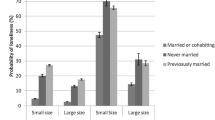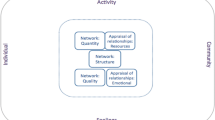Abstract
Goal of work
The purpose of the study was to assess the effect of the reported availability of social support on the 2-year survival of patients with acute myelogenous leukaemia (AML).
Materials and methods
Fifty patients with newly diagnosed AML were asked to rate the level of available social support after diagnosis was made, but before the start of chemotherapy. Social support was assessed with the F-SozU, and information about confounding variables (age, functional status, intensity of chemotherapy, cytogenetic risk group) was collected. Univariate and multivariate Cox regression analyses were used to analyze predictors of 2-year survival.
Main results
Higher levels of available social support predicted better survival, even after controlling for age, functional status, dosage of chemotherapy, and cytogenetic risk group. Within social support, the availability of instrumental support showed more consistent associations with 2-year survival than the availability of emotional support.
Conclusions
For patients with AML, the availability of social support is relevant for decreased mortality, after accounting for age, functional impairment, dosage of chemotherapy and cytogenetic risk group.



Similar content being viewed by others
References
Alferi SM, Carver CS, Antoni MH, Weiss S, Duran RE (2001) An exploratory study of social support, distress, and life disruption among low-income Hispanic women under treatment for early stage breast cancer. Health Psychol 20:41–46
Andersen BL, Kiecolt-Glaser JK, Glaser R (1994) A biobehavioral model of cancer stress and disease course. Am Psychol 49:389–404
Butow PN, Coates AS, Dunn SM (1999) Psychosocial predictors of survival in metastatic melanoma. J Clin Oncol 17:3856–3860
Byrd JC, Mrozek K, Dodge RK, Carroll AJ, Edward CG, Arthur DC et al (2002) Pretreatment cytogenetic abnormalities are predictive of induction success, cumulative incidence of relapse, and overall survival in adult patients with de novo acute myeloid leukaemia: results from Cancer and Leukaemia Group B (CALGB 8461). Blood 100:4325–4336
Caplan RD, Robinson EA, French JR, Caldwell JR, Shinn M (1976) Adhering to medical regimes: pilot experiments in patient education and social support. University of Michigan, Ann Arbor, MI
Colon EA, Callies AL, Popkin MK, McClave PB (1991) Depressed mood and other variables related to bone marrow transplantation survival in acute leukaemia. Psychosomatics 32:420–425
Cox DR (1972) Regression models and life tables. J R Stat Soc 34:187–220
Cwinkel JG, Behar LC, Zabora JR (1997) Psychosocial factors that affect the survival of adult cancer patients: a review of research. J Psychosoc Oncol 15(3/4):1–34
DeBoer MF, Ryckman RM, Pruyn JF, Van den Borne HW (1999) Psychosocial correlates of cancer relapse and survival: a literature review. Patient Educ Couns 37:215–230
Dukes Holland K, Holahan CK (2003) The relation of social support and coping to positive adaptation to breast cancer. Psychol health 18:15–29
Duric V, Stockler M (2001) Patients’ preferences for adjuvant chemotherapy in early breast cancer: a review of what makes it worthwhile. Lancet Oncol 2:691–697
Ell K, Nishimoto R, Mediansky L, Mantell J, Hamlovitch M (1992) Social relations, social support and survival among patients with cancer. J Psychosom Res 36:531–541
Fawzy FI, Fawzy NW, Hyun CS, Elashoff R, Guthrie D, Fahey JL, Morton DL (1993) Malignant melanoma. Effects of an early structured psychiatric intervention, coping, and affective state on recurrence and survival 6 years later. Arch Gen Psychiatry 50:681–689
Frick E, Motzke C, Fischer N, Busch R, Bumeder I (2005) Is perceived social support a predictor of survival for patients undergoing autologous peripheral blood stem cell transplantation? Psychooncology 14:759–770
Fydrich T, Geyer M, Hessel A, Sommer G, Brähler E (1999) Fragebogen zur Sozialen Unterstützung (F-SozU): Normierung an einer repräsentativen Stichprobe [Social support questionnaire (F-SozU): norms of a representative sample]. Diagnostica 45:212–216
Giraldi T, Rodani MG, Cartei G, Grassi L (1997) Psychosocial factors and breast cancer: A 6-year follow-up study. Psychother Psychosom 66:229–236
Goodwin JS, Samet JM, Hunt WC (1996) Determinants of survival in older cancer patients. J Natl Cancer Inst 88:1031–1038
Grimwade D, Harrison H, Oliver F, Chatters S, Harrison CJ, Wheatley K et al (2001) The predictive value of hierarchical cytogenetic classification in older adults with acute myeloid leukaemia (AML): analysis of 1065 patients entered into the United Kingdom Medical Research Council AML11 trial. Blood 98:1312–1320
Grulke N, Bailer H, Hartenstein B, Kächele H, Arnold B, Tschuschke V, Heimpel H (2005) Coping and survival in patients with leukaemia undergoing allogeneic bone marrow transplantation — long-term follow-up of a prospective study. J Psychosom Res 59:337–346
Helgeson VA, Cohen S, Fritz HL (1998) Social ties and cancer. In: Holland JC (ed) Psycho-oncology. Oxford University Press, New York, pp 99–109
Hwang SS, Chang VT, Cogswell J, Aljano Y, Osenenko P, Morales E, Srinivas S, Kasimis B (2004) Study of unmet needs in symptomatic veterans with advanced cancer: incidence, independent predictors, and unmet needs outcome model. J Pain Symptom Manage 28:421–432
Kimby E, Nygren P, Glimelius B (2001) A systematic overview of chemotherapy effects in acute myeloid leukaemia. Acta Oncol 40:231–252
Kiss A, Meryn S (2001) Effect of sex and gender on psychosocial aspects of prostate and breast cancer. Br Med J 323:1056–1058
Kogon MM, Biswas A, Pearl D, Carlson EW, Spiegel D (1997) Effects of medical and psychotherapeutic treatment on the survival of women with metastatic breast cancer. Cancer 80:225–230
Kuchler T, Henne-Bruns D, Rappat S, Graul J, Holst K, Williams JI, Wood-Dauphinee S (1999) Impact of psychotherapeutic support on gastrointestinal cancer patients undergoing surgery: survival results of a trial. Hepatogastroenterology 46:322–335
Levy SM, Herberman BR, Whiteside T, Sanzo K, Lee J, Kirkwood J (1990) Perceived social support and tumor estrogen/progesterone receptor status as predictors of natural killer cell activity in breast cancer patients. Psychosom Med 52:73–85
Maunsell E, Brisson J, Deschenes L (1995) Social support and survival among women with breast cancer. Cancer 76:631–637
Mrózek K, Heininen K, Bloomfield CD (2000) Prognostic value of cytogenetic findings in adults with acute myeloid leukaemia. Int J Hematol 72:261–271
Nannya Y, Kanda Y, Oshima K, Kaneko M, Yamamoto R, Chizuka A et al (2002) Prognostic factors in elderly patients with acute myelogenous leukaemia: a single center study in Japan. Leuk Lymphoma 43:83–87
Naughton MJ, Herndon JE, Shumaker SA, Miller AA, Kornblith AB, Chao D, Holland J (2002) The health-related quality of life and survival of small-cell lung cancer patients: results of a companion study to CALGB 9033. Qual Life Res 11:235–248
Osborne RH, Sali A, Aaronson NK, Elsworth GR, Mdzewski B, Sinclair AJ (2004) Immune function and adjustment style: do they predict survival in breast cancer. Psychooncology 13:199–210
Perera G, Domingo A, Villamor N, Palacious C, Junca J, Torres P, Llorente A, Fernandez C, Tormo M, de Llano MP, Bargay J, Gallart M, Florensa L, Vivancos P, Marti JM, Font L (2005) Adverse prognostic impact of CD36 and CD2 expression in adult de novo acute myeloid leukemia patients. Leuk Res 29:1109–1116
Pettigrew M, Bell R, Hunter D (2003) Influence of psychological coping on survival and recurrence in people with cancer: Systematic review. Br Med J 325:1066–1076
Pieto JM, Atala J, Blanch J, Carreras E, Rovira M, Cirera E, Espinal A, Gastro C (2005) Role of depression as a predictor of mortality among cancer patients after stem-cell transplantation. J Clin Oncol 23:5878–5880
Reynolds P, Kaplan GA (1990) Social connections and risk for cancer: Prospective evidence from the Alameda County Study. Behav Med 16:101–110
Rumpold G, Augustin M, Zschocke I, Strittmatter G, Söllner W (2001) Die Validität des Hornheider Fragebogens zur psychosozialen Unterstützung bei Tumorpatienten [The validity of the Hornheide Questionnaire for psychosocial support in tumor patients]. Psychother Psychosom Med Psychol 51:25–33
Sanson-Fisher R, Girgis A, Boyes A, Bonevski B, Burton L, Cook P (2000) The unmet support care needs of patients with cancer. Cancer 88:226–237
SEER Surveillance Epidemiology and End Results. Available at http://seer.cancer.gov/
Sommer G, Fydrich T (1989) Soziale Unterstützung: diagnostik, Konzepte, F-SOZU. Deutsche Gesellschaft für Verhaltenstherapie, Tübingen
Soothill K, Morris SM, Harman J, Francis B, Thomas C, McIllmuray MB (2001) The significant unmet needs of cancer patients: probing psychosocial concerns. Support Care Cancer 9:597–605
Spataro V, Kovacsovich T, Bach S, Pampallona S, Schapira M, Cavalli F (2000) Acute myeloid leukaemia in the elderly: results of an individualized approach in two centres. Leuk Lymphoma 39:521–530
Stavratsky KM, Donner AP, Kincade JE, Stewart MA (1988) The effect of psychosocial factors on lung cancer mortality at one year. J Clin Epidemiol 41:75–82
Turner-Cobb JM, Stephton SE, Koopman C, Blake-Mortimer J, Spiegel D (2000) Social support and salivary cortisol in women with metastatic breast cancer. Psychosom Med 62:337–345
Vigano A, Bruera E, Jhangri GS, Newman SC, Fields AL, Suarez-Almazor ME (2000) Clinical survival predictors in patients with advanced cancer. Arch Intern Med 160:861–868
Vogt TM, Mulloly JP, Ernst D, Pope CR, Hollis JF (1992) Social networks as predictors of ischemic heart disease, cancer, stroke, and hypertension: Incidence, survival and mortality. J Clin Epidemiol 45:659–666
Waxler-Morrison N, Hislop TG, Mears B, Kan L (1991) Effects of social relationships on survival for women with breast cancer: a prospective study. Soc Sci Med 33:177–183
Weihs KL, Simmens SJ, Mizrahi J, Enright TM, Hunt ME, Siegel RS (2005) Dependable social relationships predict overall survival in stages II and II breast carcinoma patients. J Psychosom Res 59:299–306
Wong R, Shahajahan M, Wang X, Thall PF, De Lima M, Khouri I et al (2005) Prognostic factors for outcomes of patients with refractory or relapsed acute myelogenous leukaemia or myelodysplastic syndromes undergoing allogeneic progenitor cell transplantation. Biol Blood Marrow Transplant 11:108–114
World Health Organization (1979) WHO handbook for reporting results of cancer treatment. WHO, Geneva
Acknowledgement
The study was supported by the German Cancer Aid (Deutsche Krebshilfe), grant 70-2445-Hö3.
Author information
Authors and Affiliations
Corresponding author
Rights and permissions
About this article
Cite this article
Pinquart, M., Höffken, K., Silbereisen, R.K. et al. Social support and survival in patients with acute myeloid leukaemia. Support Care Cancer 15, 81–87 (2007). https://doi.org/10.1007/s00520-006-0114-x
Received:
Accepted:
Published:
Issue Date:
DOI: https://doi.org/10.1007/s00520-006-0114-x




